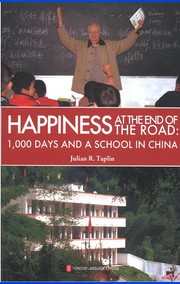 AMERICAN psychologist Julian R. Taplin first moved to China in 1998 at the age of 61. Having been diagnosed with chronic leukemia two years earlier, he was ready to live every day to the full.
AMERICAN psychologist Julian R. Taplin first moved to China in 1998 at the age of 61. Having been diagnosed with chronic leukemia two years earlier, he was ready to live every day to the full.
Since that time, since accepting an invitation from the UN to work in Sichuan as a consultant, he has made a sizable impact on China, and China has certainly had impact on him. So much so that only one chapter of his memoirs, Happiness at the End of the Road, is dedicated to the 60 years before China became a significant part of his life. The rest details his life, career and friends in China.
This book gives foreign readers a chance to feel the pulse of daily life in China and meet its people. Through it, readers experience the building of the Dawo You’ai School and witness children’s psychological rehabilitation after the deadly Wenchuan earthquake. In it Julian lays out his relationship with a Chinese family, life as a writer, exchanges with young students, and efforts to build a rural school. These four main threads are tightly interwoven.
As a former clinical psychologist centered on child, youth and family mental health, during his time in China Julian cooperated with the Sichuan Academy of Social Sciences and initiated the Three Skills Program (TSP). The program focuses on children’s psychological health education and family education in China. He has also written, translated and published 19 books in this field for Chinese parents and children, in cooperation with Chinese scholars.
Over more than a decade, Julian has shared his extensive knowledge and experience in China, giving hundreds of lectures across the country to audiences consisting of students, parents, and teachers as well as hotel workers, public servants, and the unemployed. He has held training courses for thousands of teachers, many of whom later became advocates of the TSP educational concept.
In 2003 Julian experienced further health problems, this time undergoing major heart surgery. It once again focused his thoughts on the transitory nature of life. “It turned relationships, understanding, closeness and collaboration into the things that make life precious,” he writes.
It was three years after this event that Julian set out to raise funds to build the Dawo Primary School, having been shocked at the poor conditions of the area. Dawo is only 20 km away from Ya’an City, but the unsurfaced clay road meant that it might as well be in the middle of nowhere.
The old school was on the site of a 300-year-old temple, with two adjacent classrooms built of adobe and wood. Julian donated all the royalties he made in China and encouraged his family and friends to donate to the school.
Construction of the three-story school building equipped with a cafeteria and dormitories were completed in March 2007. Julian invited his family to the inaugural ceremony and named it Dawo You’ai Xiaoxue, or the Dawo Friendship Primary School. “It is not necessary to be grateful to me,” he told the students, “the facilities I have provided aren’t worth that. You should use them to gain knowledge, discover the world, find your ideals and goals in life, and become useful members of society. You will then bring the facilities into full play.”
In May 2008 Julian had just returned from a visit to China when he heard about the disastrous Wenchuan Earthquake. “I feel more than ever like a Sichuan citizen, wishing that I were in China,” he said. He saw on the TV screen places familiar to him, and where he had given lectures, undergoing catastrophe, and couldn’t help but be deeply affected. He found that during those days he could only do two things – stare at the TV as the situation was updated, and wander around in the room like a “search and rescue dog.”
He was eager to return, but first had to have emergency surgery for nasal cancer. It wasn’t until two months later that he could eventually set foot in Sichuan. “What about the school?” was the first question he asked his friends when he arrived.
The ruined buildings that he was confronted with reminded Julian of his vagrant childhood during the Second World War, moving from place to place with his mother and other war refugees. Still traumatized by wartime life, he was familiar with what the children around him were now going through. His own experiences had cemented the belief that a new life for them had to start with post-earthquake psychological rehabilitation.
In the following days, Julian and his team traveled the earthquake epicenter along the Longmen Mountain fault zone, stopping in the most stricken places. They brought books and stationery for children and played games with them. Julian wanted them to feel safe and confident about the future.
Whether in China or far away in the U.S., the children were never far from Julian’s thoughts. The first thing he did on his return home was log on to the Internet and call his Chinese friends.
Julian, confronted frequently by his own mortality, is startlingly frank about his advancing years and failing health. He is aware that his ability to continue his work is gradually diminising and that eventually his friends and colleagues will have to take over his commitments and dreams.
But despite ups and downs in his health in recent years, Julian continues to make trips to China whenever possible. It is clear throughout the book that, though he came to the country at a relatively late stage of his life, it has become a part of him. “On the day that must come,” he writes, “someone will sprinkle my ashes in the places that we have been.”
Source: China Today
